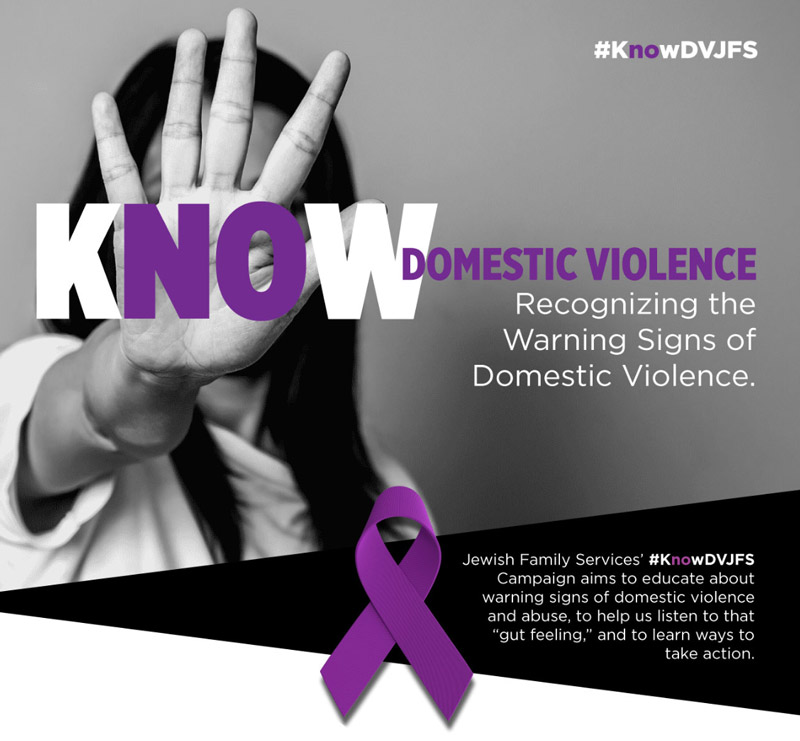Domestic Violence Awareness Month
October is Domestic Violence Awareness month. Jewish Family Services’ #KnowDVJFS Campaign aims to educate about warning signs of domestic violence and abuse, to help us listen to that “gut feeling,” and to learn ways to take action.
Stop by the JFS table in the front entrance of the LJCC during the month of October. Follow the stories. Learn the signs. Take action to Stop Domestic Violence.
8 Early Warning Signs
Love Bombing: Showers you with attention and affection early on; makes you feel special, loved, and appreciated; lowers your defenses and makes you feel closer to the person than you really are.
Moving the Goal Post: In the beginning, generally doting, kind, and affectionate; often mirrors your values and goals. Over time, changes opinions and values.
Isolating You: At the beginning, may compliment your friends and family and want to spend time with them. Over time, pulls away from your loved ones and encourages you to pull away.
Owning You: Doesn’t see you as a person, instead sees you as a possession. Early on, says you are “theirs” or claims you’re their boyfriend or girlfriend very early, sometimes before the 1st date.
Disrespecting Others: May make derogatory comments about others, call others names, tell you they dated someone “crazy” in the past, or lack close relationships with others. May appear charming, but is disrespectful when you pay attention to how they talk about others.
Double Standards: Abusers often look down on others for the same things that they do.
Blaming Everyone Else: Often blames others for their actions, and takes responsibility only when manipulating someone. Abusers tell victims the abuse is the victim’s fault or that the victim “made” them do it.
Pushing Boundaries: Breaks your boundaries, initially in small, subtle ways. For example, leaves dirty dishes in the sink after you’ve asked them to put them in the dishwasher. Over time, encroaches more and more on your boundaries.
Guidelines For Taking Action
• Calmly start the conversation on a positive note.
• Be supportive and do more listening than talking.
• Focus on un-healthy behaviors, rather than their partner as a person. Focus on concerning behaviors and share how you might feel if you experienced them and why you are concerned. Be specific about the behaviors.
• Keep the conversation friendly. It’s important for your friend not to feel judged.
• Do not place the blame on your friend. It is NOT their fault their partner is acting this way.
• Allow your friend to make their own decisions, you can’t make them decide anything.
• Off er Solutions. You can help your friend think of choices and you can suggest options, but they have to decide for themselves.
• Expect more conversations in the future.nyone can be a victim of domestic violence. There is NO “typical victim.” Victims of domestic violence comes from all walks of life, varying age groups, all backgrounds, all communities, all education levels, all economic levels, all cultures, all ethnicities, all religions, all abilities, and all lifestyles.

Domestic Violence Resources
National Domestic Violence Hotline 1-800-799-7233
Mecklenburg County CSS Domestic Violence Counseling 704-336-3210
Greater Charlotte Hope Line (Crisis Line for parenting, DV and sexual assault) 980-771-HOPE (4673)
Domestic Violence Victim Stories
Download and read each of the stories below to learn how to identify red flags and what actions you can take for each situation.
- Molly’s Story (PDF)
- Ben’s Story (PDF)
- Sophie’s Story (PDF)
